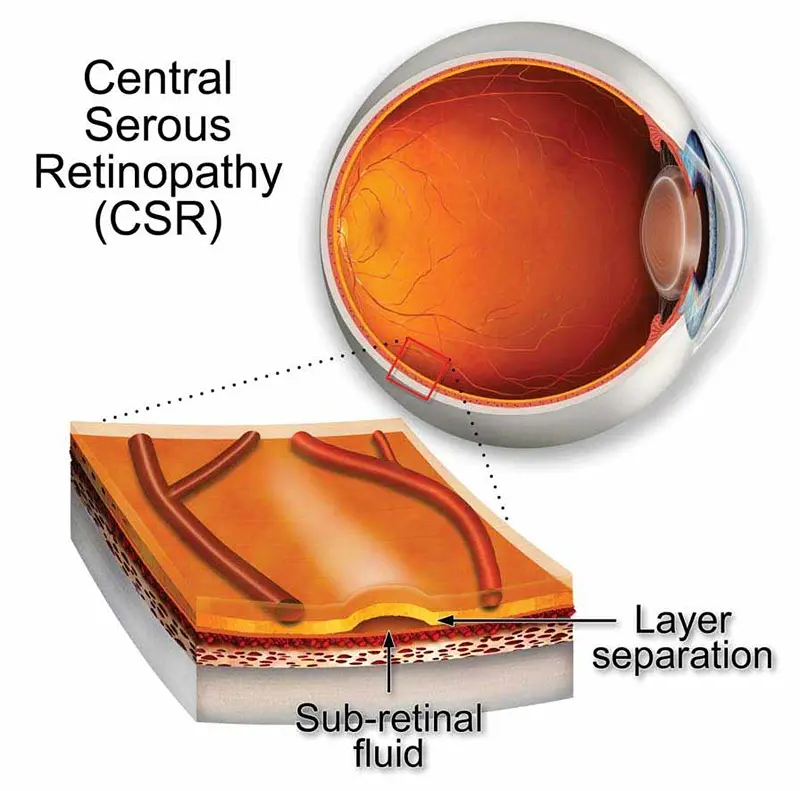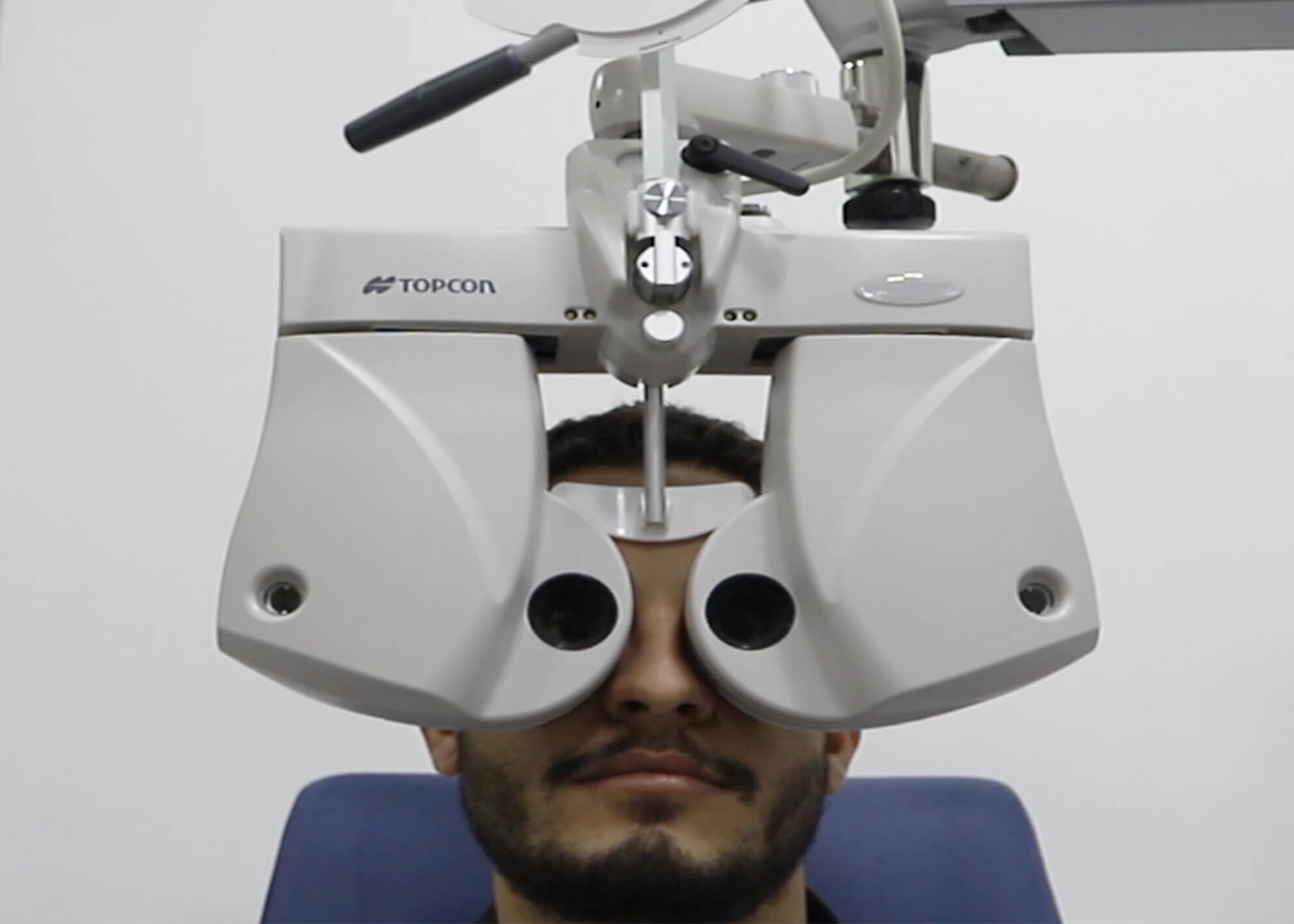Central Serous Chorioretinopathy at Eye Clinic DRHC Dubai
Understanding Central Serous Chorioretinopathy (CSCR):
Central Serous Chorioretinopathy (CSCR) is an eye condition that primarily affects the macula, the central part of the retina responsible for sharp, detailed vision. CSCR occurs when fluid accumulates beneath the retina, causing a small detachment of the retinal layers. This fluid buildup usually originates from the choroid, a layer of blood vessels beneath the retina, leading to a blister-like swelling under the macula.
CSCR typically affects individuals between the ages of 20 and 50, with men being more commonly affected than women. While the exact cause is not fully understood, it is often associated with stress, the use of corticosteroids, and certain personality traits, such as being highly driven or competitive.
Symptoms of Central Serous Chorioretinopathy:
The symptoms of CSCR can vary, but they generally include:
- Blurred Vision: Affected individuals often experience blurred or distorted vision in one eye, although both eyes can be involved.
- Central Vision Loss: There may be a dark or gray spot in the center of the visual field, making it difficult to see fine details.
- Metamorphopsia: Straight lines may appear wavy or bent.
- Micropsia: Objects may seem smaller than they are.
- Color Vision Changes: Colors may appear less vibrant or washed out.
Causes and Risk Factors:
While the precise cause of CSCR remains unclear, several risk factors have been identified:
- Stress and Cortisol Levels: High levels of stress are strongly associated with CSCR. Stress leads to an increase in cortisol and other stress hormones, which can cause changes in the blood vessels beneath the retina, resulting in fluid leakage.
- Corticosteroids: The use of corticosteroid medications, either oral or topical, is linked to an increased risk of developing CSCR.
- Pregnancy: Hormonal changes during pregnancy, particularly elevated cortisol levels, increase the risk of developing CSCR. Pregnant women are more susceptible due to the body's heightened hormonal activity and stress during this period.
- Personality Traits: Individuals with Type A personalities, who are more prone to stress, are at higher risk.
- Other Risk Factors: Conditions such as hypertension, sleep apnea, and Helicobacter pylori infection have also been associated with CSCR.
Diagnosis of Central Serous Chorioretinopathy:
At DRHC Dubai, we utilize advanced diagnostic techniques to accurately diagnose CSCR, including:
- Optical Coherence Tomography (OCT): This non-invasive imaging test provides detailed cross-sectional images of the retina, allowing our specialists to detect fluid buildup and assess the extent of retinal detachment.
- Fluorescein Angiography: A dye is injected into the bloodstream, and a series of photographs are taken to visualize the blood vessels in the retina. This test helps identify the source of fluid leakage.
- Indocyanine Green Angiography (ICGA): Similar to fluorescein angiography, ICGA uses a different dye to provide more detailed images of the choroidal blood vessels.
Management and Treatment of Central Serous Chorioretinopathy:
CSCR often resolves on its own within a few weeks to months without the need for treatment. However, in cases where vision is significantly affected or the condition becomes chronic, intervention may be necessary. At DRHC Dubai, we offer a range of treatment options tailored to each patient's needs:
- Observation:
- In many cases, CSCR is self-limiting, and vision may return to normal without treatment. Regular monitoring with follow-up visits allows our specialists to track the condition's progression.
- Laser Treatment:
- Photocoagulation: A laser is used to seal the leaking blood vessels, reducing fluid accumulation. This treatment is generally reserved for cases where the leak is located away from the central macula to minimize the risk of damage to central vision.
- Micropulse Laser Therapy: A gentler form of laser treatment that delivers energy in short pulses, reducing the risk of damage to the retina. It is often used in chronic or recurrent cases of CSCR
- Photodynamic Therapy (PDT):
- PDT involves the use of a light-activated drug (verteporfin) and a non-thermal laser to target abnormal blood vessels in the choroid. This treatment helps reduce fluid leakage and is particularly effective in chronic CSCR cases.
- Medications:
- Anti-corticosteroids: In cases where corticosteroid use is linked to CSCR, discontinuing or reducing the medication under medical supervision may be recommended.
- Mineralocorticoid Receptor Antagonists: Medications such as eplerenone have been shown to help reduce fluid accumulation in some patients by targeting the underlying mechanisms of fluid leakage.
- Lifestyle Modifications:
- Stress management techniques, including relaxation exercises, yoga, and counseling, may help reduce the risk of recurrence. Our specialists at DRHC Dubai work with patients to develop personalized strategies for managing stress effectively.
Why Choose DRHC Dubai for CSCR Care?
At DRHC Dubai, our team of experienced ophthalmologists is dedicated to providing comprehensive care for patients with Central Serous Chorioretinopathy. We combine cutting-edge technology with a patient-centered approach to ensure the best possible outcomes. Whether through advanced diagnostic tools, innovative treatments, or supportive care, we are committed to helping our patients achieve optimal vision health.
.png?width=281&height=59&name=bookanappointment%20(1).png)
At Dr. Rami Hamed Center, our Ophthalmology department is dedicated to safeguarding your vision health through expert eye care Professionals, Renowned as one of the best eye care clinics in Dubai our Ophthalmology Specialists provide services for Cataract, Retina treatment with Laser and Refractive surgeries.




.png?width=281&height=59&name=bookanappointment%20(1).png)






